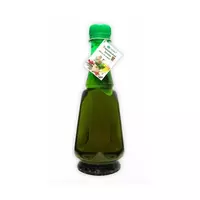Dill oil

This annual plant, which is distinguished by an unusually rich aroma and pleasant taste, is known to almost everyone in our country. Dill, which is produced in July-August, is planted annually by millions of people in their household plots with the aim of using the fresh greens of the plant and its seeds for culinary purposes.
In addition, the value of dill and its miniature fruits as a drug is important, which is used not only in the complex therapy of a number of diseases, but also acts as a starting material for the production of valuable essential oil.
Dill oil is extracted on an industrial scale from ripe fruits of the plant, which are previously subjected to the mandatory drying stage, and then the steam distillation method is applied. As is known, fruits contain about 4-6 percent of essential oil, so a significant amount of plant seeds is required to produce this natural substance.
The useful properties of dill oil are due to its chemical composition, in which substances such as carvone, limonene, a-pinene, dipentene, fellandren, terpinene, eugenol and myristicin are present.
Externally, the resulting dill essential oil is a greenish-yellow or almost colorless volatile liquid, which in turn differs in a spicy, sweet aroma. In the food industry, the taste and aroma properties of dill oil are relevant in the manufacture of brandy, vermouth, liqueurs, as well as a number of other alcoholic beverages that are rich in taste.
The essential oil of dill is characterized by the presence of a considerable number of useful properties that can curatively affect different organs of the human body. Due to this, dill oil helps, removing slags and toxins, to comprehensively cleanse the body. Thanks to the light diuretic and laxative effects, this essential oil stimulates the activity of the digestive system, eliminates constipation, reduces bloating.
For the beautiful half of humanity, and of various ages, dill oil is also unusually useful. The fact is that by mimicking the hormone estrogen, it activates the activity of the endocrine glands and acts as a natural catalyst for the production of its own estrogen. Thus, with the use of dill oil, it is possible to significantly relieve the condition of a woman with painful sensations every month and solve the problems associated with menopause.
Dill oil, like fennel oil, is often used to make the so-called dill water, which is advised to be given to children with flatulence. And during breastfeeding, the use of dill essential oil inside increases the milk produced, and therefore dill oil (like fennel oil) is often added to most homeopathic products that are intended for this purpose.
dill oil 899 kCal
Energy value of dill oil (Ratio of proteins, fats, carbohydrates - ju):
Proteins: 0 g (~ 0 kCal)
Fats: 99.9 g (~ 899 kCal)
Carbohydrates: 0 g (~ 0 kCal)
Energy ratio (b | y): 0% | 100% | 0%
 Español
Español Français
Français Português
Português Русский
Русский 简体中文
简体中文 繁體中文
繁體中文 日本語
日本語 한국어
한국어 العربية
العربية Türkçe
Türkçe Қазақ
Қазақ Deutsch
Deutsch Italiano
Italiano Українська
Українська
